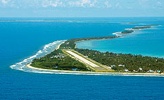Brian Fallow took a detailed look at carbon trading and pricing in yesterday’s Herald.
Mark Lewis, a London analyst with Deutsche Bank, has raised eyebrows by forecasting a price of €35 ($63.31) a tonne for allowances traded on the internal European emissions market over the 2008 to 2020 period. That compares with a market price of around €20 for 2008. It is also about five times higher than the $13 a tonne carbon price the Government uses in estimating the value of this country’s Kyoto liability in the Crown accounts.
In a month or two the government will be announcing its design for a domestic emissions trading scheme, and the relationship between the NZ price and the international price will be an important feature. Another will be how the scheme phases in various sectors of the economy. Labour has signalled it wants an “all gases, whole of the economy



